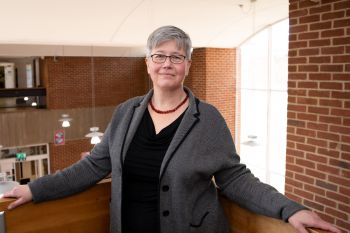News article
“Access to university is one of our greatest sites of inequality”: –°¿∂ ”∆µ VC on widening participation
By: Anna Ford
Last updated: Friday, 23 September 2022

Professor Sasha Roseneil
has said today, Friday 23 September, that access to higher education, particularly in the more selective universities and on the most popular courses, remains one of the greatest sites of inequality in the United Kingdom.
, Professor Roseneil, the Vice-Chancellor at the –°¿∂ ”∆µ, said:
“Increasing the number of people engaging in higher education is vital to the future of our economy and society, but this expansion must reach all those who can benefit from going to university. We will not find all those from disadvantaged and under-represented groups if we focus exclusively, or even primarily, on postcodes rather than personal experience of disadvantage.”
In the opinion editorial, which was published ahead of Professor Roseneil appearing on HEPI-organised panels at both the Labour and Conservative party conferences, she argues that the existing area-based measures to attempt to widen the pool of students entering higher education are problematic. They suffer from problems of both reliability and validity, which creates unacceptably high rates of both false positives and false negatives at the level of the individual.
An applicant’s postcode does not reveal their parental household income, nor the professional status or educational achievement of their parents, says the –°¿∂ ”∆µ Vice-Chancellor. These should be factors that contribute to assessing whether an applicant is socioeconomically disadvantaged. Instead, universities should look at more reliable indicators such as the length of time for which a child receives free school meals, any evidence of being brought up in care, and whether they are an asylum seeker or refugee.
While the –°¿∂ ”∆µ has already developed a number of programmes designed to identify and encourage applications from students from particularly under-represented groups, Professor Roseneil has raised the bar for her University’s intentions in this field, saying: “It is also our ambition to support more care-experienced young people to study at –°¿∂ ”∆µ.”
Professor Roseneil said:
“Like many other universities, we make contextual offers to applicants, reducing entry grade requirements in recognition of a range of challenges that may have impacted their education. Our approach is based on a decision to not just focus on postcode-related targets but to consider carefully the individual circumstances of all those who apply to –°¿∂ ”∆µ. Since we have developed this work, our contextual offers have risen to 17% of all offers made, and we hope to grow this proportion significantly over time.”
In her piece, Professor Roseneil has commended news that UCAS applications will now include questions that allow students to identify themselves as a refugee or asylum seeker, as having caring and parenting responsibilities, as being from a UK Armed Forces family or a former member of the Armed Forces, as well as having been in receipt of free school meals. Handing the baton to universities, however, Professor Roseneil says that it is now up to universities to make good use of this new information about applicants.
Giving examples of ways in which the –°¿∂ ”∆µ aims to widen the pool of its students, Professor Roseneil has referred to the newly announced scholarship programme, funded by the philanthropic Rudd Family Foundation, which will provide annual £5,000 bursaries to care-leavers over the next ten years. It is the University’s largest ever donation for undergraduate students.
The –°¿∂ ”∆µ has a new Gypsy, Roma Traveller (GRT) programme which combines academic research with secondary school activities and outreach. Research has shown that children from GRT backgrounds have the poorest GCSE outcomes of any measured ethnic or cultural group, and they are 11 times less likely to go to university than their peers.
In 2022, the –°¿∂ ”∆µ also partnered with , a charity that supports the progression to higher education for students from a care experienced background. The University was the first to host a residential summer school in August this year for 30 year 9 young pupils from across the UK.
–°¿∂ ”∆µ also works with which is an award-winning charity delivering programmes of university-style teaching to small tutorial groups in schools which serve less advantaged communities. Next year (spring 2023), the University will be the first to pilot a new project with the Brilliant Club, called ‘Make Your Mark’, which will give our undergraduates an employment opportunity to provide in-school support learning strategies to year 10 pupils.